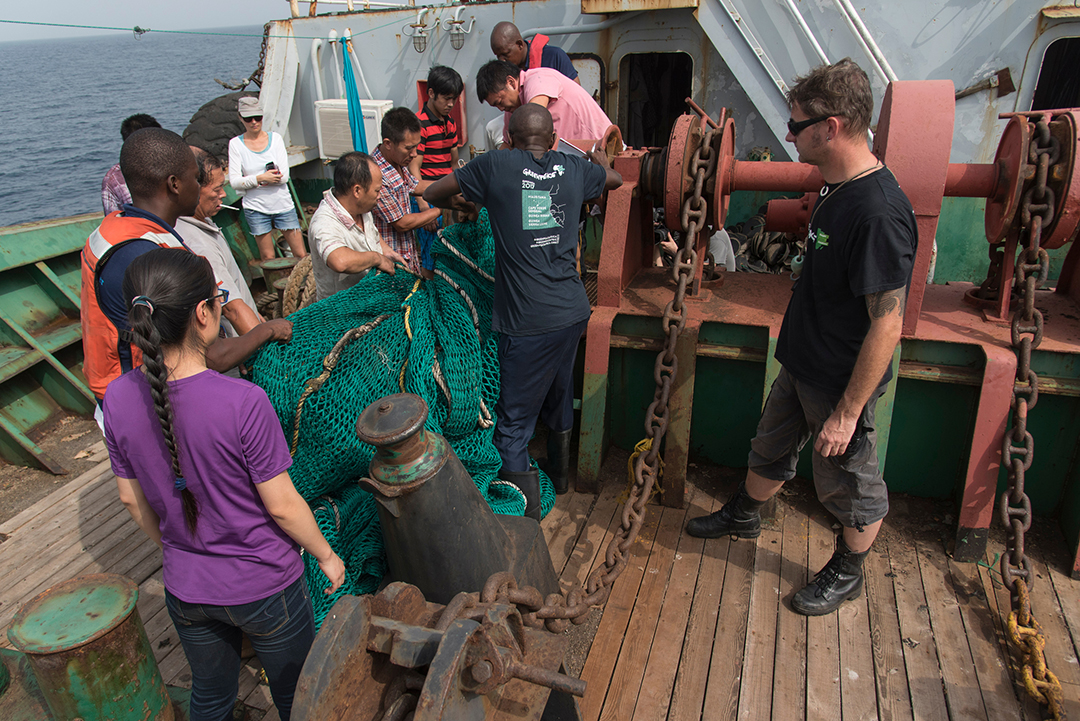Study: Chinese Fleets Decimate Fisheries in West and Central Africa
ADF STAFF
China’s distant-water fishing fleet (DWF) has targeted Gulf of Guinea waters in West and Central Africa for decades. Now, the region is rapidly running out of fish, driving food insecurity and loss of income for millions of people who work in the fishing industry.
A recent study by the Hoover Institution, a think tank at Stanford University, examined the effects China’s DWF has had on Cameroon, the Republic of the Congo, Gabon and Nigeria, where Chinese trawlers notoriously engage in illegal, unreported and unregulated (IUU) fishing. In the entire region, 40% to 60% of the fish is caught illegally, analysts say.
The presence of China’s DWF — the world’s largest — forces artisanal fishermen to venture much farther out to sea, often returning with little or no catch, Agnes Ebo’o, a distant-water fishing expert who authored the study, said in a report by Nigerian newspaper Premium Times. China also has the world’s worst IUU fishing record, according to the IUU Fishing Index.
“Distant water fishing by itself is not illegal and has been practiced for centuries,” Ebo’o said in the report. “However, lead fishing companies are trending toward criminality, notably by way of tax fraud, corruption and other economic crimes associated with [IUU] fishing.”
A lack of patrol vessels and surveillance systems makes it hard for authorities to monitor the Gulf of Guinea’s combined coastline of more than 6,000 kilometers. In the Republic of the Congo, for example, the Kouilou divisional fisheries inspection directorate has only two patrol vessels, according to Ebo’o. She noted that Chinese fishing vessels make up almost all of the industrial fishing fleet in the country’s waters.
Weak governance, lack of transparency mechanisms, and limited administrative and legal frameworks to address IUU fishing also compound maritime challenges in the region, Ebo’o wrote. The results are costly.
Illegal marine trade costs West Africa almost $1.95 billion across the fish value chain and $593 million per year in household income. IUU fishing also drives food insecurity as it decimates fish populations, destroys ecosystems and has been linked to piracy, kidnapping and drug trafficking.
In 2021, The European Union (EU) issued Cameroon a “yellow card” for its inadequate response to IUU fishing. A yellow card is a warning that sanctions may be imposed if the country does not improve its efforts to halt IUU fishing.
“It is unfortunate that Cameroon has not been able to ensure proper control of fishing activities happening under its flag,” Virginijus Sinkevičius, the EU’s commissioner for environment, oceans and fisheries, said in a statement. “The Commission stands ready to work and cooperate with Cameroon to implement the necessary reforms.”
According to the Environmental Justice Foundation, Cameroon is known to offer a “flag of convenience” to fishing vessels operating illegally with little monitoring and enforcement. A flag of convenience refers to a company paying for its fishing vessels to fly a particular country’s flag, although the beneficial owner is located elsewhere.
The Nigerian House of Representatives reported in 2021 that the country loses $70 million per year due to IUU fishing, including loss of license fees, tax revenue and money that could have been made by artisanal fishermen.
Gulf of Guinea nations continue to favor “rentier” systems of licensing or making bilateral agreements with industrial and semi-industrial fishing companies, “even though this approach benefits distant-water fishers and rich fishing nations more than host countries,” Ebo’o wrote.
Noting that individual countries are responsible to maintain sustainable fishing and ensure that marine resources are not exploited, West and Central African nations “ought to develop strategies to protect their maritime domain from predatory practices such as unethical DWF, through criminalization and effective sanctioning of illegal practices,” Ebo’o added.


Comments are closed.